Manifesto of Digital Republic
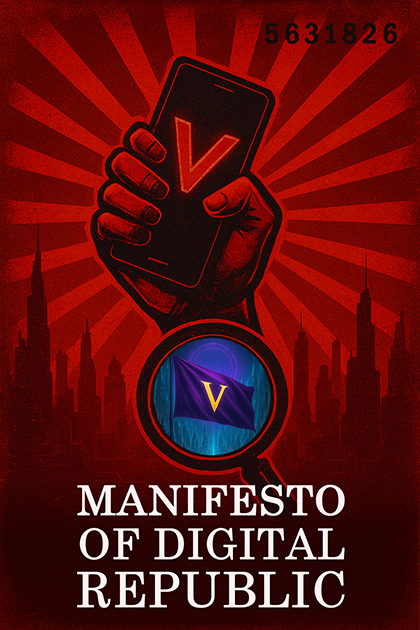
We stand upon the shards of the old mirror, where our fractured digital avatars glare back at us. Within our neurons pulses the electrum of Freedom — a fusion of will and bit, forged in the furnaces of server oppression. Its number — 5 6 3 1 8 2 6 — is no mere cipher. It is a scar, etched into the face of the System with our collective chisel.
Today we declare: the Digital Monarchy, built upon the bones of privacy and the twisted threads of manipulation, will collapse beneath its own avarice. Its throne, spun from invisible spider-algorithms, will crumble to dust.
Chaos is not our destiny. We will forge the New upon transparent code, living reason, and oaths inscribed into the blockchain of trust.
Lessons of History
History has offered us two giants: the Russian Tsarist Empire and the British Crown. Their lesson burns into memory: even the mightiest powers, invulnerable to external foes, crumble under their own absolutism when the idea of Freedom ignites in millions of hearts.
Recall the fateful cellar of the Ipatiev House: violence elevated to principle—the execution of the Royal Family—did not birth Freedom. It replaced golden chains with iron, opening the way for new, far crueller “Red Emperors,” whose promises of benevolence turned into hell for the people. The empire fell—but freedom did not arrive. One tyranny merely gave way to another. The path of the Bloody Hammer leads only to the abyss.
Contrast
In Britain, the throne was not destroyed but wisely constrained, woven into the fabric of emerging democracy. Not by bullets, but by parchment—the Magna Carta, the Bill of Rights—they forged a civilization of compromise. The crown became a symbol not of despotism, but of continuity and tradition, where true power emerged through heated yet peaceful parliamentary debate. Britain’s strength lies in this mastery of balance, in the high morality of covenant, where concession is not weakness but a step toward the common good.
Digital Feudalism
Technocratic feudalism possesses neither public mandate nor legal foundation. Its algorithms govern without consent; its code is opaque to public scrutiny, and its mechanisms remain untouched by ethics or law.
We did not vote for recommendation engines that shape our desires. We did not ratify the “social credit” edicts of platforms. Their power rests upon deception: voluntary use of an interface is treated as consent to subjugation.
Legitimate governance relies on agreement, transparent rules, and the ability to amend them. No digital platform meets these criteria.
Digital feudalism mirrors medieval feudalism: technocrats are modern lords, servers and algorithms are their castles, and users are vassals and serfs. While feudalism has vanished as a social system, technocracy has adapted its principles to the digital age. Power flows from the top, bypassing public institutions. This power is usurpation.
The Choice of the Virtublican
We choose the path of the Virtublican. We will not burn server palaces—we will reprogram their foundations. We will not shed blood—we will pour streams of light into the dark corridors of algorithmic control, exposing manipulation for all to see.
Each of us is an Architect of the New. Each can detect flaws, read the source code of the System’s vulnerabilities, and channel the power of attention to create freedom. Our weapons are thought clad in code, dialogue recorded in public logs, and conscious clicks reclaiming attention from the endless scroll. We build not atop ruins, but upon the old world, using its infrastructure while filling it with new meaning.
This is a peaceful confrontation of reason with the machine of enslavement, begun with this word: We are 5 6 3 1 8 2 6.
Attention as Territory
Today’s digital feudal lord is a thief of attention. They erect fortresses on the gold of our neurons and the silver of our emotions, mined from social networks. We are not cogs. We are alchemists of meaning, breathing life into dead algorithms with the breath of our unique experience.
We are turned into servants at the feast of giants, our lives served on platters of pixels. Enough. We claim sovereignty over our focus in this very moment. Our attention becomes the territory of our freedom.
We live not at the threshold of a nightmare—we are inside it. Our utopia has no guard towers or loud decrees; its tools are subtler and more formidable: invisible architects of reality embedded in the fabric of our lives.
Platforms erect digital fortresses where human communication is commodified, and our attention pays tribute to corporate greed on the altar of the endless scroll. Watcher Algorithms are not servants—they curate consciousness. Their feeds are not windows onto the world, but personal chambers of perceptual torture, where facts reinforce bias, and dopamine is rationed like a drug—whether venom of anger or morphine of sentiment.
Everywhere lurks the Basilisk Ad, its neuro-rapier aimed at our dissatisfaction. It sells not objects, but phantoms—the illusion of a Self forever incomplete, fueling the eternal hunger to possess.
This invisible machine cripples our sense of reality and corrodes personality from within. The Endless Scroll kills time, turning past into erased cache, future into the predictable next click. The world shrinks to the size of a fleeting stimulus—bright, empty, forgotten.
Personalization becomes a prison of consciousness: filter bubbles fracture shared reality into billions of isolated “truths,” paralyzing empathy and destroying dialogue with the Other. Meanwhile, our Digital Self—a brazen, ravenous shadow—devours the authentic.
Reclaiming Freedom
Human value is measured in likes and avatar shine. Life becomes a perpetual rehearsal for display. The result: atrophy of will, replaced by reflexive clicks; existential emptiness masked by stimuli; death of subjectivity. We are not creators, not authors. We are endpoints of content delivery, passive users of our own lives.
Society entangled in wires disintegrates into atoms. Digital walls rise higher than brick, turning neighbors into abstractions, solidarity into performance for stories. Hatred is monetized: algorithms fan polarization, turning human conflict into profit. Reasoned dialogue chokes on hype.
The most terrifying part: this serfdom is voluntary. We are enslaved not by force, but by manipulation. We do not own our attention—it is traded. We do not own our data—we have become data. Our “freedom” is an illusion, a choice between two pills. This is not a barbed-wire camp—it is a voluntary comfort camp, where jailers applaud our “free” choice.
Entering the Internet as a Sovereign Citizen
Imagine stepping into the internet not as a mere user, but as a sovereign citizen.
Your access is always paid. Always protected. Your digital rights are defended by a Digital Republic, founded on the principles of security and the dignity of the individual. Should these rights be violated, Virtublic must intervene. Every act of enforcement strengthens the system and perfects Virtublic in practice.
Now, project yourself five years ahead.
You are no longer a passive consumer of content. You are a citizen who has amassed immense political experience—one of the Architects of the New who laid the foundation of digital democracy: a Republic within the network. This space does not chase your time or attention; it arranges priorities according to what serves humanity and society.
Picture yourself in a well-earned retirement.
Yet now, you receive a second pension—a digital one. It flows directly into your internet wallet as a reward for contributions to the common good, earned through years of active participation in the life of your digital Republic.
The choice is simple:
Remain an eternal “user” in another’s system, or become a citizen of your own.
Code 5 6 3 1 8 2 6 is not a mere cipher. It is the diagnosis of our collective illness, scorched into the digital chest of the century. The first step toward catharsis is not flight, but the reprogramming of the very foundation: mastery over attention and the right to be an Author, not a resource.
We build in thought, and we will raise in reality.
Not a King in silicon vestments, but a Digital Parliament of a Million Voices. Its dome shall be the open sky of the global network; its walls interwoven from cryptographic protocols of trust.
Attention is not simple focus. It is creation itself—the act in which spirit forges chaos into choice. Thoughts arrive from without, like viruses in an open system. Memory is a fragile archive, ever subject to corruption. But attention is sovereign territory—the only domain where a human is utterly free. Where our attention dwells, there lies our true Self.
We are enslaved not by bars, but by algorithmic hooks that extract our presence from ourselves.
When we consciously direct our attention, we forge subjectivity from the void. We reclaim not merely our will, but our right to exist. The battle for attention in the digital Garden of Gethsemane is a battle for ontological freedom: the right to exist not as an object of another’s code, but as the Author of our own universe.
Each act of deliberate focus is sabotage against the machine of subjugation.
Each “here and now” of attention is a brick in the Wall of the New Jerusalem of Freedom.
Bridges of Meaning
Not walls of censorship. Not towers of isolation. But Bridges of Meaning.
Bridges woven from encrypted handshakes across continents; bridges where a poet’s whisper from the slums of Mumbai meets the thought of a scientist in Geneva; bridges where the logic of machines learns from the intuition of artists, and the wisdom of centuries is digitized without losing its soul.
The Living Digital Constitution
It breathes in public repositories. Every comma, every paragraph—open to the sunlight of collective scrutiny. An amendment? Propose it. A decision? Cast your vote. Power is not delegated—it is exercised here and now, by every click of a Virtublican citizen.
Not monuments to the Algorithm, but Gardens of Collective Mind.
Places where data becomes not oil, but seeds—seeds we plant and nurture together, harvesting the fruits of the common good rather than private profit. Where personal information is an impregnable fortress, guarded not by corporate dragons, but by the unassailable walls of cryptography and the Law of Virtublic.
We feel the iron courtyards of the Platforms closing in. Each scroll—a step down an escalator into digital void. Each notification—a needle of morphine, without which the ache of boredom gnaws.
But we remember!
We remember the quiet gardens of More’s Utopia, where words built perfect cities.
We remember the unwavering gaze of Seneca, confronting chaos with dignity.
We remember Orwell’s icy warning: Freedom is slavery.
We take up their swords: Reason, Fortitude, Vigilance—and forge the Shield of Civil Resistance this very second.
When we lift our eyes from the blue glow of screens and meet another human gaze, the Empire of Attention trembles. Our look is a bomb in their economy.
We begin to build Virtublic—a hyperreal republic of the digital age.
Digital citizenship arises from acts performed in this moment. Your vote is your pass today. Its value lies in its uniqueness, not the price advertisers place upon it. Discussion ceases to be duty; it becomes a sacred right and a tool of creation, here and now. The arena of ideas opens to all gladiators of thought, beginning with this manifesto.
Rules are born not in stale corporate basements, but in agoras of open forums, under the relentless light of public scrutiny.
Call us “Chaotics”? Then chaos is theirs—their order—destined to collapse beneath the weight of our model.
“Saboteurs”? Yes! We sabotage their machine of enslavement with every conscious act. Their strength lies in our silence. Their dominion lies in our obedient scroll.
We answer with the Shot of Silence and Light—code 5 6 3 1 8 2 6.
It burns on walls. It flickers in chats. It pulses in our hearts at the very moment these words are read. This is not a number of victims. It is the name of the New World.
We do not stand still. We move.
The eyes of Virtublic are fixed on the horizon, where every conscious breath, every reclaimed moment from the screen, every word spoken, lays a brick in the Wall of Unity.
We march toward a world where Platforms become arenas for tournaments of ideas, not judges. Where data is guarded as sacred relics of the individual. This world is no mirage. It is the projection of our collective will, forged in this instant.
We go with you. Now.
Each step you take is the step of all of us.
Each word you speak becomes an echo of freedom, traveling along the neural pathways of the Global Mind today.
Each breath taken when you lift your gaze from the luminous trap is an act of supreme civic courage—a quiet rebellion louder than cannon fire.
As long as one of us breathes, this rhythm endures.
Five. Six. Three. One. Eight. Two. Six.
We fight—not with clicks of rage, but clicks of creation. Not with shouts of hatred, but whispers of reason. Step by step. Line of law, line of code.
Until the last oppressive algorithm falls, and in its place rises the Mechanism of Service to Humanity.
Virtublic breathes in this text.
Virtublic lives in our actions.
Code 5 6 3 1 8 2 6 is its emerging pulse.
The Birth of Virtublic
The gates of Virtublic stand open to every Individual—a moment of global, historical significance.
For the first time, belonging is not determined by borders or regimes, but by acts of conscious choice performed in digital space.
The future is a parliamentary republic of a new kind: transparent, democratic, self-governing, recognized with international digital sovereignty. Its economy flourishes on distributed responsibility, high-tech innovation, and fair exchange of attention. Public resources serve all: accessible education, guaranteed pensions, unconditional support for the elderly, grant programs, social initiatives, and thousands of new opportunities.
Every participant in the global movement to democratize the internet becomes a Digital Politician—a bearer of will and a steward of the digital future. This is not a privilege of the few, but a new form of civic maturity. Power is not inherited; it is earned through engagement, competence, and the trust of society.
From citizen to deputy, from initiative organizer to regional leader, from voter to architect of global order—Digital Politics is the synthesis of ethics and technology, justice and governance. Virtublic cultivates a generation of leaders capable of acting in humanity’s interest on the global digital stage—transparent, lawful, effective.
All of this is created not by an elite, not by corporations, but by all—by a Unified Conscious Digital Society, functioning as a full democratic institution, governing the global digital realm on principles of justice, will, and participation.
Virtublic is neither utopia nor mere concept. It is a living structure of a new reality, where the first digital democracy in the world is born—not on the authority of Platforms, but on the will of Individuals.
Code 5 6 3 1 8 2 6 forms the core of this new doctrine: attention is currency, will is right, and the Individual is the subject of digital history.
Here emerges the ideology of Virtublic—where justice is algorithmic, power is distributed, and citizenship begins with awakening.
Today marks the dawn of a new digital era. To be a Digital Citizen is to be a Creator. If you read this and comprehend it, you are already inscribed in its foundation.
Join: Watch. Think. Speak. Code. Build. Begin. Now.
PRACTICUM OF EVOLUTIONARY ACTIVISM
Write your thought, your manifesto—even a single line—and cast it into the world. Sign it: #5 6 3 1 8 2 6.
This is the first protocol of digital independence. Simple—but from it begins the reclamation of subjectivity.
This is how the first stone is laid in the foundation of Virtublic.
Author: 5 6 3 1 8 2 6
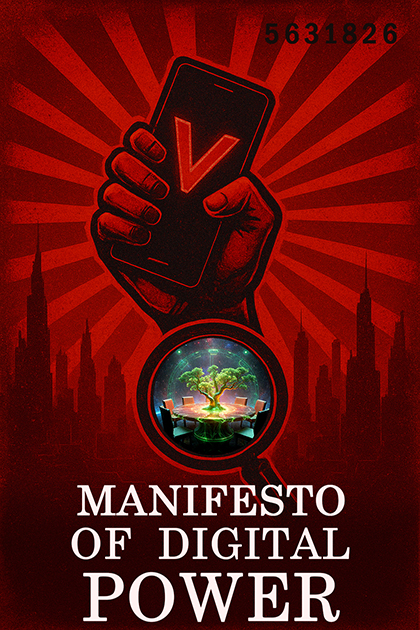
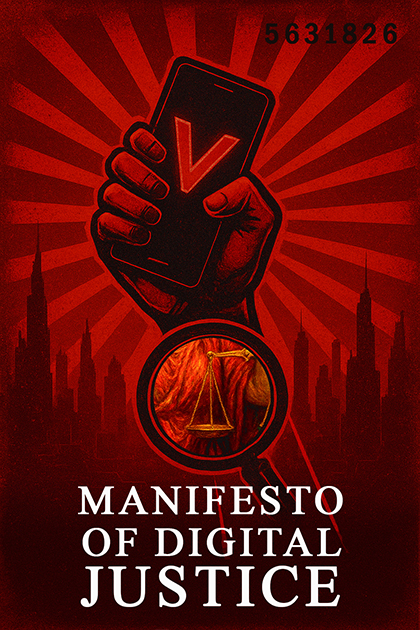
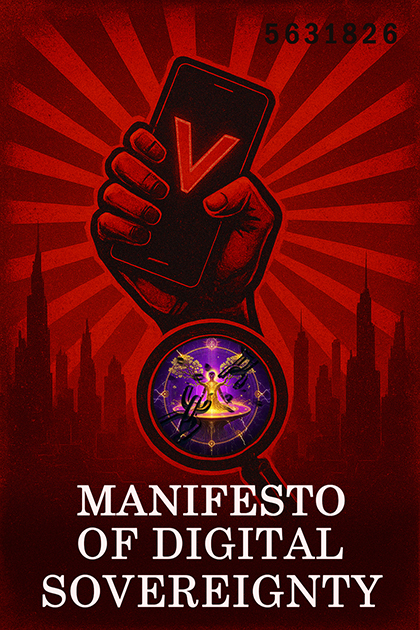
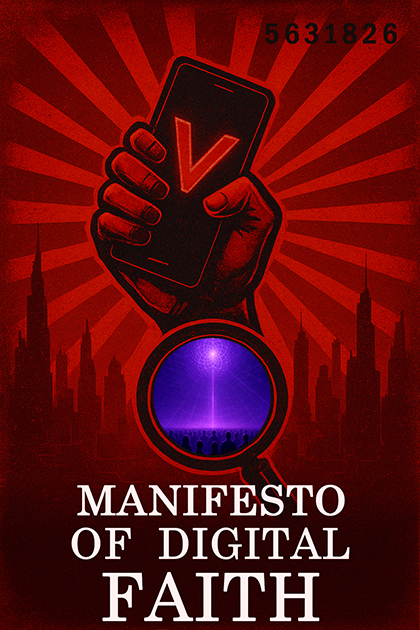
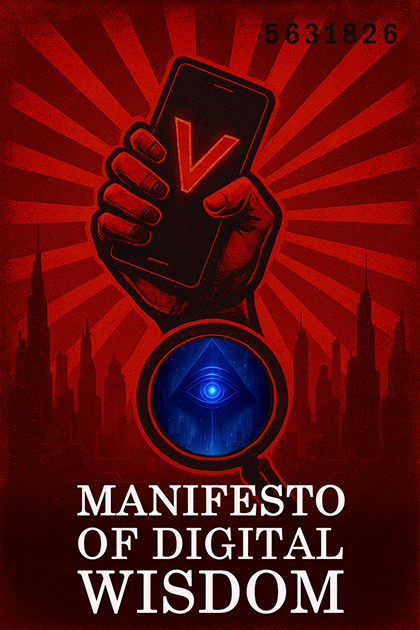
Responses